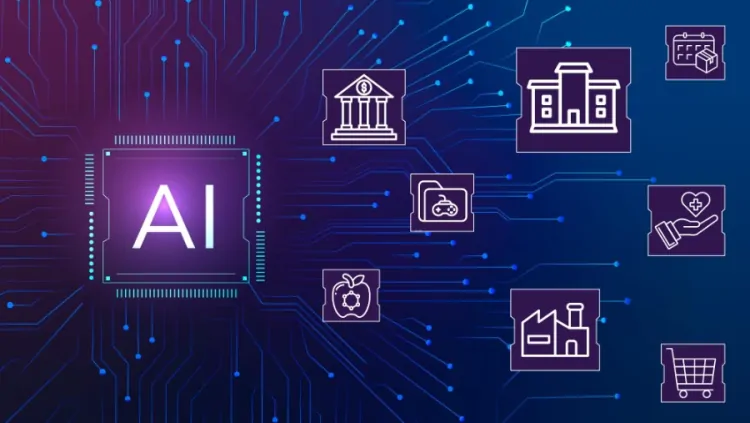How Is AI Revolutionizing Different Industries?
AI is enhancing fraud detection, risk management, and customer experiences. Algorithms analyse transaction patterns to identify fraudulent activities.

Introduction
Artificial Intelligence (AI) is revolutionizing industries by automating tasks, enhancing decision-making, and fostering innovation. By leveraging machine learning, natural language processing, and computer vision, AI is enabling businesses to achieve unprecedented efficiency and accuracy. From healthcare and finance to manufacturing and transportation, AI is transforming operations and redefining customer experiences. Therefore, investing in the Artificial Intelligence Training in Delhi can open doors to numerous career opportunities for aspiring professionals. While its potential is immense, responsible AI adoption remains crucial to address challenges such as data privacy, bias, and job displacement, ensuring equitable benefits for all sectors and society.
All About AI
Artificial Intelligence (AI) refers to the simulation of human intelligence in machines programmed to think, learn, and make decisions. AI systems leverage algorithms and large datasets to perform tasks that typically require human intelligence, such as problem-solving, natural language understanding, image recognition, and decision-making.
AI is broadly categorized into narrow AI and general AI. Narrow AI specializes in specific tasks, such as voice assistants like Siri and Alexa, while general AI, still theoretical, would possess the ability to perform any intellectual task a human can do.
Key AI techniques include machine learning, where systems improve through data without explicit programming, and deep learning, a subset using neural networks to model complex patterns. Other branches include computer vision, natural language processing (NLP), and robotics.
AI is transforming industries, enhancing efficiency and innovation. For instance, in healthcare, AI aids in diagnosing diseases; in finance, it detects fraud; and in transportation, it powers autonomous vehicles.
Despite its advantages, AI poses ethical concerns, including data privacy, bias in algorithms, and job displacement. Responsible AI development emphasizes transparency, fairness, and accountability to mitigate these risks.
AI continues to evolve, shaping the future of technology and society. It holds the potential to solve global challenges, but harnessing it responsibly is crucial to ensure equitable benefits for all.
How Is AI Revolutionizing Different Industries?
Artificial Intelligence (AI) is a transformative force reshaping industries by enabling automation, enhancing efficiency, and driving innovation. Its applications span diverse sectors, making processes smarter and more streamlined. Moreover, AI along with ChatGPT Training can create diverse opportunities for aspiring professionals.
1. Healthcare
AI is revolutionizing healthcare through improved diagnostics, personalized treatment, and operational efficiency. Machine learning algorithms analyze medical images to detect diseases like cancer at early stages. AI-powered chatbots and virtual health assistants provide real-time support to patients, while predictive analytics helps hospitals manage resources efficiently.
2. Finance
In finance, AI is enhancing fraud detection, risk management, and customer experiences. Algorithms analyze transaction patterns to identify fraudulent activities. AI-driven chatbots handle customer queries, while robo-advisors provide personalized investment advice. Credit scoring models now integrate AI to assess risks more accurately.
3. Retail
AI transforms retail by offering personalized shopping experiences, inventory management, and sales forecasting. Recommendation systems suggest products based on customer behaviour, while AI-powered chatbots assist with queries. Computer vision enhances in-store experiences with cashier-less checkouts.
4. Manufacturing
AI optimizes production lines through predictive maintenance and process automation. Smart sensors identify potential equipment failures before they occur, reducing downtime. AI-powered robots perform repetitive tasks with precision, improving quality and efficiency.
5. Transportation
Autonomous vehicles, powered by AI, are set to redefine mobility. AI also improves traffic management and logistics. Ride-sharing apps use machine learning to optimize routes, while supply chain automation ensures timely deliveries.
6. Education
AI-driven tools are personalizing learning experiences. Adaptive learning platforms tailor content based on individual progress while AI-powered grading systems streamline assessments. Virtual tutors and augmented reality enhance engagement.
7. Entertainment
In entertainment, AI curates content recommendations, enhances gaming experiences, and generates realistic visual effects. Platforms like Netflix and Spotify use AI to suggest movies and songs based on user preferences.
Conclusion
AI's ability to analyze vast data sets, automate tasks, and provide insights is revolutionizing industries, and enhancing productivity and innovation. One can join Artificial Intelligence Training in Gurgaon for the best training opportunities. However, ensuring ethical AI adoption with a focus on transparency and fairness is crucial to maximizing its benefits while addressing challenges like job displacement and data privacy concerns.
FAQs
1. How is AI used in healthcare?
AI improves diagnostics, personalizes treatments, and enhances operational efficiency by analyzing medical data and assisting in disease detection and resource management.
2. What role does AI play in finance?
AI detects fraud, manages risks, and enhances customer experiences with robo-advisors, chatbots, and predictive algorithms for financial decision-making.
3. Can AI improve manufacturing efficiency?
Yes, AI optimizes production through predictive maintenance, process automation, and smart robotics, reducing downtime and improving product quality.
4. How does AI enhance retail experiences?
AI personalizes shopping with recommendation systems, chatbots, and inventory management tools, creating efficient and tailored customer experiences.
5. What are the challenges of adopting AI?
Key challenges include data privacy concerns, algorithmic bias, job displacement, and the need for ethical and transparent AI development practices.
What's Your Reaction?







![Tips to Pass Pegasystems PEGAPCSSA87V1 Exam - [Verified Dumps] & Practice Test](https://aboutsoul.in/assets/img/bg_slider.png)





